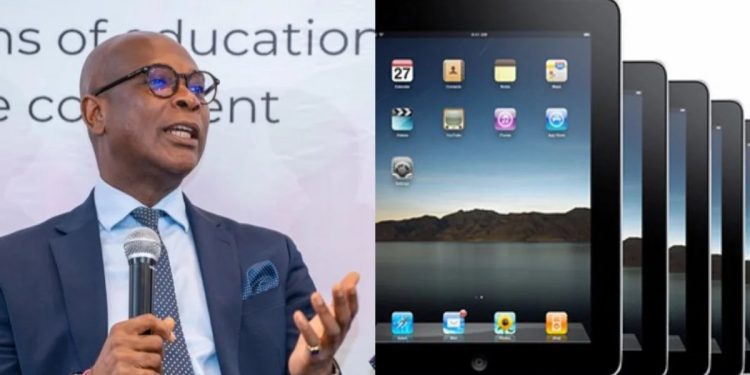By Hassan Osman Kargbo
In a significant boost to the nation’s education sector, the Government of Sierra Leone, through the Ministry of Basic and Secondary School Education (MBSSE), has entered into a pioneering contract with Tiwai Memory Masters to supply 6,061 solar-powered tablets. This initiative aims to support the Free Education Project and improve learning experiences in schools, particularly in remote areas without reliable electricity.
The contract signing took place on October 23, 2024, at the MBSSE Conference Room in Freetown, attended by key officials, stakeholders, and representatives from Tiwai Memory Masters. Minister of Basic and Secondary Education, Conrad Sackey, heralded the project as a transformative step towards enhancing educational quality across the nation.
“The introduction of solar-powered tablets in our schools reflects our unwavering commitment to quality education for all Sierra Leoneans,” Sackey said during the ceremony. He highlighted that the tablets would facilitate essential functions, including attendance tracking, offline teacher training, and access to a wealth of educational resources such as instructional videos.
Valued at $2.79 million and backed by the World Bank, these rugged, solar-powered tablets are designed to thrive in challenging environments, ensuring functionality in schools that struggle with electricity supply. Each school will receive one tablet under the innovative “One Tablet Per School” initiative.
The procurement process of the tablets commenced last December 2023, following a thorough evaluation system to select the most responsive bidder. Tiwai Memory Masters emerged victorious, receiving World Bank approval for the contract in July 2024. The selected devices underwent testing and were approved with minor modifications to meet quality and durability standards.
Sackey emphasized the tablets’ multi-functional capabilities, which extend beyond attendance monitoring to support professional development for teachers. “By conducting teaching observations, these tablets will identify specific areas for teacher growth, reinforced by instructional videos tailored to address classroom strengths and challenges,” he explained.
A noteworthy feature of the tablets is their biometric authentication system, which ensures secure data management, particularly for student attendance records. Each tablet will come equipped with a solar power kit and accessories, enabling schools in remote regions to utilize these vital educational tools effectively.
The contract stipulates that Tiwai Memory Masters adhere to the Financial Act of 2024, which includes a 6.5% withholding tax and performance-based guarantees. Inspections before delivery will be conducted to ensure that the products meet government standards, facilitated by the Ministry of Communication, Technology, and Innovation.
Under the terms of the agreement, the supplier is responsible for managing import duties and ensuring timely delivery within 16 weeks. Upon arrival, a meticulous inspection will occur, with representatives from MBSSE, the Teaching Service Commission (TSC), and the project Secretariat verifying the devices before distribution.
Payment for the tablets will be staggered: 10% upon delivery, 80% upon completion certification, and the final 10% after all tablets have been distributed to schools. MBSSE will oversee the entire distribution process, ensuring that all tablets reach their intended destinations and are effectively utilized in classrooms.
The contract signing was concluded with a commitment from Tiwai Memory Masters to provide quality and durable tablets within the specified timeframe. The Deputy Director of Enterprise Data Network at Tiwai Memory Masters expressed gratitude to the government for their trust in the company, assuring stakeholders of their commitment to fulfilling the project’s objectives.
With this initiative, Sierra Leone is taking a crucial step towards bridging the educational gap, ensuring that students in even the most remote areas have access to modern learning tools. The introduction of solar-powered tablets not only promises to enhance educational equity but also supports the government’s long-term vision for a more inclusive and effective educational system.













